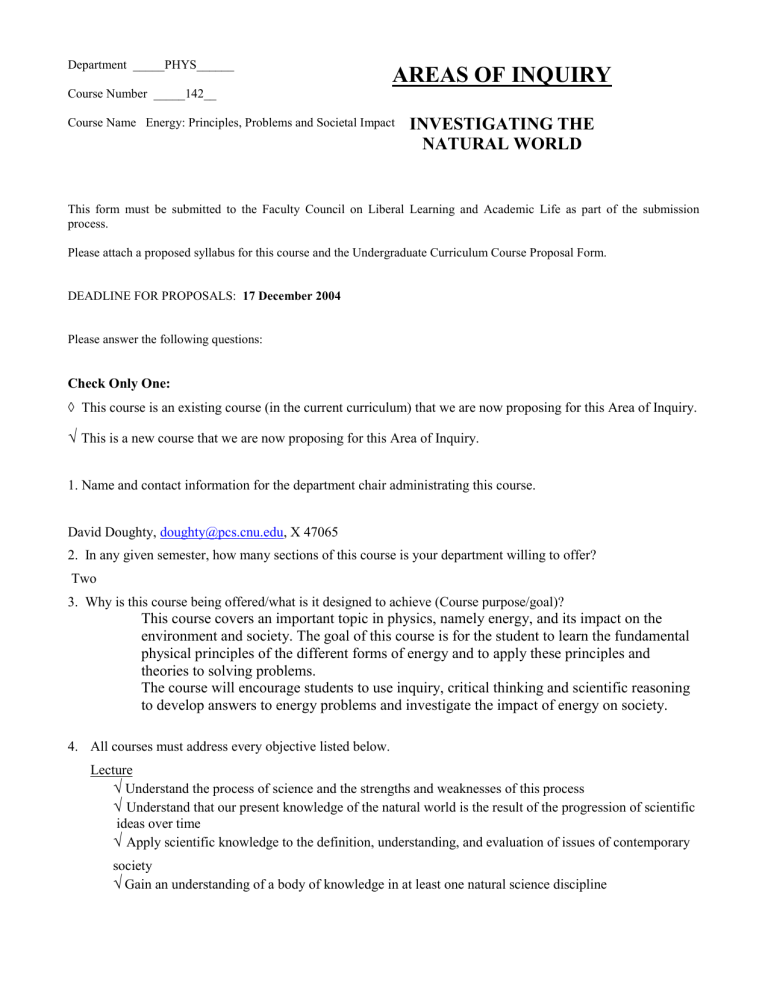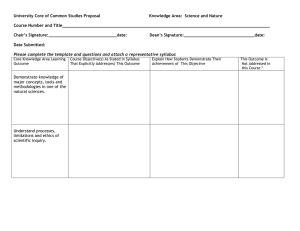AREAS OF INQUIRY INVESTIGATING THE

Department _____PHYS______
Course Number _____142__
AREAS OF INQUIRY
Course Name Energy: Principles, Problems and Societal Impact
INVESTIGATING THE
NATURAL WORLD
This form must be submitted to the Faculty Council on Liberal Learning and Academic Life as part of the submission process.
Please attach a proposed syllabus for this course and the Undergraduate Curriculum Course Proposal Form.
DEADLINE FOR PROPOSALS: 17 December 2004
Please answer the following questions:
Check Only One:
This course is an existing course (in the current curriculum) that we are now proposing for this Area of Inquiry.
√
This is a new course that we are now proposing for this Area of Inquiry.
1. Name and contact information for the department chair administrating this course.
David Doughty, doughty@pcs.cnu.edu
, X 47065
2. In any given semester, how many sections of this course is your department willing to offer?
Two
3. Why is this course being offered/what is it designed to achieve (Course purpose/goal)?
This course covers an important topic in physics, namely energy, and its impact on the environment and society. The goal of this course is for the student to learn the fundamental physical principles of the different forms of energy and to apply these principles and theories to solving problems.
The course will encourage students to use inquiry, critical thinking and scientific reasoning to develop answers to energy problems and investigate the impact of energy on society.
4.
All courses must address every objective listed below.
Lecture
√
Understand the process of science and the strengths and weaknesses of this process
√
Understand that our present knowledge of the natural world is the result of the progression of scientific
ideas over time
√
Apply scientific knowledge to the definition, understanding, and evaluation of issues of contemporary
society
√
Gain an understanding of a body of knowledge in at least one natural science discipline
Laboratory (NA)
Engage in asking and answering questions using the scientific process
Conduct analyses and evaluation of data from scientific experimentation
Present results and draw conclusions in both written and oral formats
Apply the scientific process to present-day questions
5.
Briefly explain how this class addresses the above objectives.
This lecture-type class covers principles of physics that are related to generation, transportation and conservation of energy. Students will gain a basic understanding of physics throughout the semester by studying energy. The course will include investigating all forms of energy: mechanical energy, electromagnetic energy, thermodynamic energy, nuclear energy, solar energy and other forms of energy. Students will get a better understanding of how energy generation and consumption have evolved over the years.
Energy conservation, the effect of energy on the environment and its large impact on society are some examples of the issues that will be discussed. Students are encouraged to use their independent research skills to find solutions for some these issues that greatly affect our lives.
The course will use physics text books that deal with this topic. Students will be required to develop problem solving skills, to answer concept questions and to search articles and data bases as part of their research papers.
6.
Course Assessment: Identify how this course will accomplish the above objectives (choose at least one).
√
Participating in class discussion and debate
√
Engaging in teamwork and other collaborative exercises
√
Writing analytical or evaluative papers, perhaps incorporating original research
Making oral presentations
Performing laboratory experiments
Conducting data analysis
Participating in fieldwork
√
Other means – please identify Problem solving homework that requires the process of science will be assigned on a weekly basis. The assignments will cover physics and energy concepts. Additional assignments will cover energy losses, efficiencies in different systems and alternative fuels to gain an appreciation for contemporary societal issues.
7.
Attach a proposed syllabus, which includes a statement of purpose, course objectives, and how these objectives will be accomplished.
See Attached Syllabus
8. If this course contributes to any of the foundations for liberal learning given below, please explain how.
Oral Communication Literacy:
Students will participate in class discussions and explain their points of view regarding the effects of energy decisions on society and the environment.
Information Literacy:
Students will search the most recent scientific articles and data bases for their research papers.
Writing Literacy:
Writing assignments for the class will include energy policy and how it gets shaped by different players including scientists, elected officials, special interest groups and the media. Other writing assignments, will deal with the impact of specific types of energy on the environment, e.g. fossil fuel or nuclear energy.
8.
Explain how this course connects to Vision 2010 – the CNU Strategic Plan (www.cnu.edu/Vision2010).
This new course will address all goals of University Priority I, Vital Curriculum. The class will challenge students by providing a rigorous science course (goal A), requiring them to use critical thinking to investigate the impact of energy decisions on the environment (goals B and D) and encouraging them to use their independent research to find solutions for some the issues that faces our society (goal C).
Submission Checklist:
By the deadline, submit a packet with the following documents to the Assistant Dean for Liberal Learning. Please submit in electronic and hard copy form.
√
Area of Inquiry Course Proposal Form
√
Syllabus for the Course
If needed:
√
Undergraduate Curriculum Committee New Course Proposal Form
_____ Undergraduate Curriculum Committee Change to Existing Course Form
PHYS 142
Energy: Principles, Problems and Societal Impact
Dr. Selim
Office Hours: MWF 11- Noon
T, Th 10:45- Noon; 2:15 – 4:00 pm
OR by appointment email: rselim@cnu.edu
Tel. 594-7364
Office: Gosnold 215A
Texts: 1. Energy Physical, Environmental and Social Impact, by Gordon Aurbrecht
3 rd edition, Prentice Hall Publishing Co.
2. Energy: Principles, Problems, Alternatives by Joseph Priest, 4 th
edition, Addison Wesley
Publishing Co.
Goals: 1. Learn the fundamental principles of the different forms of Energy: mechanical, electrical, thermal, nuclear and solar.
2. Apply these fundamental principles and theories to solve problems.
3. Use inquiry, critical thinking and scientific reasoning to develop answers to energy problems.
Topics: Energy Principles, Mechanical energy, Electromagnetic energy, Thermodynamic energy,
Nuclear energy, solar energy and other energy Systems. Energy conservation, environmental, global and societal issues will be addressed.
Lab: A separate one semester lab (PHYS 105L) will satisfy the lab requirement of Natural Science Area of Inquiry.
Homework: Assignments will be given on Monday/Tuesday; discussed in class the following
Monday/Tuesday and are due nine days from the initial day of the assignment. Problem solving homework that requires the process of science will be assigned on a weekly basis. The assignments will cover physics and energy concepts. Additional assignments will cover energy losses, efficiencies in different systems and alternative fuels to gain an appreciation for contemporary societal issues.
Quizzes: Weekly quizzes will be given covering the previous week’s reading assignment.
Exams: Three one-hour exams and a comprehensive final exam. See schedule below.
Grading: Homework 25%
Each hourly exam 15%
Final exam 30%
Final grades will be assigned as follows:
A = 93-100%; A - = 90-92 %
B + = 87-89 %; B = 83 –87 %; B = 80 – 83 %
C + = 77-79%; C = 73 –77 %; C = 70 – 73 %
D + = 67-69%; D = 63 –67 %; D = 60 – 63 %: F < 60%
Disability Statement: Any student who believes that he or she is disabled should make an appointment to see me to discuss your needs. In order to receive an accommodation, your disability must be on record in Disability Services located in the Academic Advising Center, Room 125, Administration Building
(Telephone 594-8763).
Week Reading Topics Comments
of assignment
8/22 Ch. 1
8/29 Ch. 2
9/5 Ch. 3
9/12 Ch. 4
9/19 Ch. 6
9/26 Ch. 7
10/3 Ch. 8
10/10 Ch. 9
Energy and Society
Energy principles
Fossil Fuel
Electric energy
Electromagnetic energy
Infringements on the
Global Atmosphere
Thermal energy
Automobiles
10/17 Ch. 10
10/24 Ch. 12
10/31 Ch. 13
11/7 Ch. 14
11/14 Ch. 16
11/21
11/28
12/7
Nuclear physics
Nuclear energy
Solar Energy
Other energy systems
Energy Conservation
Social Impact
Review
TEST 1
No class on Mon.
Oct 10 (fall break)
TEST 2
TEST 3
No classes Wed. & Fri. Nov
23-25 (Thanksgiving)
Final Comprehensive
Exam.
3.
2.
UNDERGRADUATE CURRICULUM COMMITTEE
NEW COURSE PROPOSAL FORM
Does this proposal affect Liberal Learning requirements? Yes
√
No _____
1. Title of Course: Energy: Principles, Problems and Societal Impact
Proposed Course Number (cleared with Registrar): PHYS 142
Prerequisite Courses: None
(if you require a minimum acceptable grade greater than the default of D- , please indicate the grade you require) _________
Catalogue Description (including credits, lecture, and lab hours):
PHYS 142. Energy: Principles, Problems and Social Impact (3-3-0)
Prerequisite: None
Fall and Spring
This course is intended for undergraduate students who are non-science majors. Topics include
Energy Principles, Mechanical energy, Electromagnetic energy, Thermodynamic energy,
Nuclear energy, Solar energy and other energy Systems. Energy conservation, environmental issues and societal impact issues will be discussed.
Is the course cross-listed? If so, what is the number of the other course?
No.
**A proposed syllabus, including complete text and/or reference information, as well as any relevant information to this decision, must be appended.
NOTE: All affected department chairs must sign approval on last page.
See attached syllabus.
For whom is the course primarily intended? Explain why it should be added to the curriculum.
This course is intended for undergraduate non-science majors. It satisfies part of the Natural
World Area of Inquiry of the new curriculum. It introduces students to basic physics principles by studying a topic of great importance to our society.
If this course is required, append a description of how the course fits into the curriculum. Indicate how it affects hours required for graduation.
This course is not required. It satisfies part of the Natural World Area of Inquiry of the new curriculum.
4.
5.
Has this course been offered previously as a special topics course? If so, when? What course number was used?
No.
Has this course, or one closely related to it, been offered at CNU previously?
If so, is that course currently being offered? How does the proposed course differ? When is the last term the old course will be offered?
6.
No.
What is the anticipated enrollment per offering for the next three years? About 50 - 60 students in each semester it is offered.
During which term will this course first be offered?
Fall 2007
√
Spring 2007
√
Summer 20___
During which semesters will this course regularly be offered?
Fall 2007 _
√
Spring 2008
√
Summer 20___
7.
8.
Print in the __2006-07______ (academic year) Undergraduate Catalog.
How will the course be staffed?
All full-time physics professors are qualified to teach this course. Initially Professor Selim will teach the course, but Professors Brash, Caton, Doughty, Hardie and Knipp can teach it too.
Does the course involve a particular classroom, special equipment, or costs beyond those usually associated with a course at CNU? If so, please explain.
No.
9.
Is the course repeatable for additional credit? If so, is there a limit to the number of times the course can be repeated? (e.g., applied music courses)
10.
No.
If this course is for an Area of Inquiry a. Identify the Area of Inquiry ___Investigating the Natural Word ______________________
Demonstrate how your course will meet the objectives of this Area of Inquiry b.
See attached application for approval as an area of inquiry course.
This course was approved by:
(Liberal learning core courses must be reviewed by BOTH academic Deans.) Concur Do Not
| Concur**
Department(s): (1) Date: ________
(2) Date: ________
College Curriculum
Committee: Date: ________
Dean: Date: ________
Dean: Date: ________
Undergraduate Curriculum
Committee: Date: ________
Changes to the Liberal Learning requirements must be reviewed by the Faculty Senate.
Faculty Senate President: Date: ________
Provost Date: ________
Distribution by Provost Office following approval:
Department Chair(s), UCC Chair, Deans, Registrar
** If “Do Not Concur” is checked, please attach a statement of explanation.
Rev. 03/20/05

